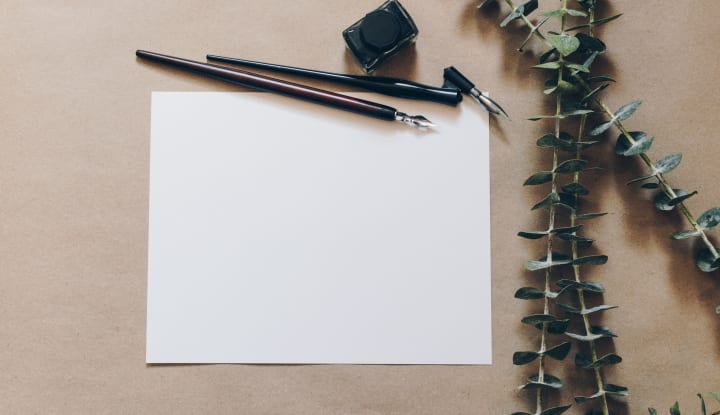If you can gift yourself only one thing this year, Write a note
As the best things in life are free

At my worst moments, I often find myself stuck in a whirlpool of negativity. It feels like a maze that I can’t escape. I find myself struggling, searching for a hand, ladder, rope, something that would help me get out.
During this period of extreme frustration, I often engage in criticizing myself or wallowing in self-pity. Then, I start feeling bad about feeling bad and find myself sinking further into the pool.
When the feeling passes and I eventually do get out, this experience leaves a bad taste in my mouth. I spend a lot of time wondering, contemplating my (past) behavior, and looking for answers.
I also aggressively refer to motivational, inspirational content in the form of books, videos, podcasts, articles, and more.
While this helps me with the current situation, I find it difficult to apply my learnings to the next situation. I find myself decently capable of diffusing the problem when I am normal and equally clueless in the eye of the storm.
When someone else discusses their (seemingly) unsolvable problem with me, I can offer constructive advice, which is generally well-received and followed. However, I am never really able to give the right advice to myself. By this, I mean lengthy, genuine, and compassionate guidance.
The idea of writing a note to myself came to me one night while I was journaling. It arose from this need for specific, individualized, and real advice. I wondered:
What would happen if I gave an inspirational speech to myself?
What if I document the same in the form of a note, which I could refer to at later times of distress?
I wanted to try this exercise, where I have a symbolic out of body experience, wherein I can create some distance from myself, objectively analyze my problem/s (while I am facing them), and then give myself appropriate advice.
This advice should ideally be generic as well as specific, the generic part working for a category of situations.
I wanted to be compassionate to myself. I did not want to engage with my usual brand of toxic self-criticism. I also did not want to give myself an obvious, pull your socks up advice. Instead, I wished to educate myself about what I should be doing to get through the situation.
The first note that I wrote to myself was a therapeutic experience and had a surprising effect on me.
______________________
A window into the state of my mind, before the note

Before this exercise, my mind was an utter mess. To be candid, my primary motivation behind this was to show myself some love. I had an acute need for this, as I had spent a good couple of months severely doubting myself in ways that I would have previously considered to be unimaginable.
I would obsessively plan a day, down to every 15 minutes. If I couldn’t follow the plan, I would beat myself up (mentally) for not doing so.
No excuse or reason would suffice. If I did follow the program and complete all the scheduled tasks in the right way, then I would start doubting the plan itself.
I would ask myself, was I one hundred percent sure that this was indeed the most, that I could have gotten out of that day? I would call myself a slacker and continue this line of questioning until no ounce of (my well-deserved) sense of accomplishment remained.
This pattern (along with a few other things), led me to fall into a vicious cycle of anxiety and sleep deprivation. I was so anxious that I couldn’t sleep; thus, I couldn’t get much work done, and I would wind up having a bad day. Rinse and repeat.
Unfortunately, after trying several methods of self-improvement throughout the year (that were having a positive effect on me), December happened to be my lowest month.
I desperately needed a change of direction. I wanted something that would get to me, shake things up, and make me feel the need for change.
Thus, I wondered, what if I could get to myself?
______________________
The note:
In this note, I chose to speak to myself in the second person, as it helped me attain an objective perspective.
Part 1/2:
Before you start reading, close your eyes, and take three deep breaths.
Next, you need to remember that whatever the situation may be, however dire or urgent, first, you need to make yourself feel better, and only then can you start working on it (constructively). Any other method has not worked for you, ever. You deserve this detour.
Start small: close your eyes, and listen to one of your favorite songs. You could also listen to (a frequently used) guided meditation, look at your pictures at the beach, or read your favorite quotes (out aloud).
You know what, prepare a personalized calm folder and keep it handy (in your phone and laptop) for moments like these.
“Peace is not always easy to grasp or keep close. In the process of attaining and protecting it, you may find yourself tired, weary, and uncertain on how to keep your peace safe. While being uncertain is normal, continue to commit yourself to peacefulness. You are worthy of every drop of sweetness and ease that you encounter. Being tested is a part of the journey. Giving up and letting go is not.”― Alex Elle
What you need next is a reliable, foolproof, pick-me-up guide.
Here’s the first version:
- Nothing is perfect. This world, people, objects, situations, and you all are imperfect. There is immense beauty in imperfection; you always aim to see this in other things. Now, try to see it in yourself as well. You are imperfect, and that’s ok, it’s perfectly normal.
- We all make mistakes. You already know this but find it challenging to apply, as you are not mentally prepared to err, often. What would you say is your standard rate of success? It’s 2 out of 3 times. The 1/3 sets you off.
- They make you feel like a failure. A small error makes you (feel) sloppy, and a large blunder makes you (feel) incompetent. They shouldn’t. It is ok to make mistakes. Answer me this: do you always try to identify, analyze, and learn from your mistakes?
- There is no such thing as a good day. You shouldn’t start a day by expecting that everything is going to happen, as planned and in your preferred way. Tell me, what are the chances of this actually happening?
- Most days are average, a mixed bag of some good and some bad things. You should not aspire for the ideal. Repeat after me, tomorrow is going to average, that’s normal, and I am going to be ok with it.
- Constant doubt does not lead to better performance. In the recent past, you have doubted yourself non-stop. Simultaneously, you have also been able to meet some of your goals. This should not reinforce your doubting tendencies.
- You can perform in spite of constant self-doubt and criticism, not because of it. You have been able to perform because you can. Imagine, if you could remove all this negativity from your mind, successfully, wouldn’t that have a favorable effect on your performance?
- Develop a sense of judgment. You need to know when to push yourself and when to believe in yourself. Most of the time, it should be belief and on some occasions when you can spot laziness, or (known) harmful patterns of behavior, push yourself.
- Learn to focus on the positive. Think of your larger goals, think of that feeling of accomplishment and contentment you get when you create something of value.
- Reinforcing Belief. When you are down, is not the best time to kick yourself. It is particularly in such moments that you need to believe in yourself. A real and unconditional trust. If you don’t do this, who else will?
- Follow this:
When you fall, you will take care of yourself
When you get up, you will cheer for yourself
When you win, you will celebrate yourself
And, when you are tired of the impossibility of things—you will inspire yourself.
______________________
Part 2/2

After you have successfully picked yourself up, the next thing on your agenda should be inspiration.
You don’t do this enough. Don’t allow yourself to criticize, judge, or second-guess. Wholeheartedly, inspire, and motivate yourself. So, this (current) problem/situation has gotten you down and appears to be unsolvable. You think that there’s no way out.
But, tell me, is there any problem, fear or negative situation that you haven’t conquered till now?
Escaping is not sustainable. You deal. You have dealt with pain, suffering, anger, bitterness, and more, and have always come out on the other side. How much time it has taken you, or whether it happened in the right way is not relevant. It’s the outcome that matters (here).
“It is during our darkest moments that we must focus to see the light.” — Aristotle
Try this activity:
- Make a list of things that you have conquered in the recent past (6 months)
- Make a list of things that you are currently dealing with (work in progress)
- If you had to select only one motto for yourself, it would be: Be Better Every day.
- Now, looking at the recent past as a whole (without obsessing over the few hiccups), have you achieved this? You undoubtedly have.
- Now with this lens, observe your current problem/s. Do they seem significant anymore? Not so much. You can overcome this, and you will.
Next, we arrive at the pivotal step of constructively working on the issue at hand. I know that this is going to seem overwhelming to you. Yet another thing to work on. Can nothing in life ever be easy?
“Life is not easy for any of us. But what of that? We must have perseverance and above all confidence in ourselves. We must believe that we are gifted for something and that this thing must be attained.” ― Marie Curie
You already believe in this. Life is not easy, and it’s not supposed to be. It is always going to be a work in progress.
What you need is an (all-inclusive) step by step process, describing how to work on something. It will enable you to divide the large/complex problem into doable chunks. It would also offer you some (much needed) clarity and a common starting point.
Here’s the first version:
You are ok.
Do not let anything, however big or small, stand in your way. Move on to your next task of the day, or take the rest of the day off and recuperate. Your only objective should be restoring yourself to a healthy state.
______________________
Let me leave you with some rules and affirmations to practice:
- Always set realistic goals and not optimistic goals. Leave room for error.
- As you cannot control the weather, similarly, you also cannot control or predict your physical health, mental health, and other situational, external entities.
- The right way to set goals is to focus on the journey and not on the end. Keep trying to do your best every day.
- Know the crucial difference between happiness and contentment. You are pursuing the latter. Remind yourself of this, now and then.
- Try to resolve why living with yourself makes you anxious. Continue your work on unraveling, understanding, and being your (true, authentic) self.
- Before you set out to move mountains, accept yourself, take care of yourself, and love yourself.
- The definition of living is having a life; everything else is extra. Being you is tough. If you are ever bogged down by the question, What have you achieved till now?
- Tell yourself this: You were yourself. You lived. You fought. You survived.
______________________
My reaction to this note:

After penning down this note, I read it back to back, twice, and it brought tears to my eyes, goosebumps to my skin, and left a lingering warm feeling in my heart. After having gone through this experience, I regretted not having this (simple) idea before.
It genuinely made me forget the negative emotions that seemed permanent (until now) and brought me back to a pleasant state.
The note had the power to calm me, and believe me, that has been an impossible feat in the past. More importantly, it made me feel loved. It seemed as if a warm embrace, a release of tension, and a gripping speech were all rolled into one (note).
It also helped me reset. I felt like the problem, subsequent anger, self-criticism, and sadness were in the past. The positive feeling that the note left me with, is in the present, and I am now free to think of the future and carry on as if everything was normal.
It (unexpectedly) encouraged me to take up two new projects: creating a personalized calm folder and a how-to work on myself when I don’t feel like it guide, both of which would prove immensely helpful to me in the future.
Subsequent readings of the note left me with feelings of gratitude, wonderment, and invigoration. I also learned something new with every read. I also observed some long term effects of this activity.
Firstly, it encouraged me to write notes to my past and future self, as well. They would help me cope with my past objectively and prepare for my future adequately without my reservations about myself holding me back.
Secondly, it thoroughly moved me and inspired me to my core. The reading of the note may have lasted for a few moments, but these feelings were everlasting.
And thirdly, it enabled me to preempt certain situations. At times, it figuratively caught me when I was about to fall.
I found myself pausing, foreseeing a harmful reaction, and reassuring myself that it’s ok, this is normal, such incidents happen, do not give it the power to deter your grit for the day.
“The more you praise and celebrate your life, the more there is in life to celebrate.” — Oprah Winfrey
______________________
So, did my advice get to me?
It certainly did.
The first note I wrote to myself was a delightful surprise. It reaffirmed my faith in myself. I also felt confident about publishing it, as this act would make me believe in it more.
It would be permanent, real, and out there for everyone to view.
I have always believed that no one knows me better than myself, and thus, the right advice (from myself), fit me like a glove. It’s highly personalized nature made it revolutionizing, therapeutic, logical, objective, easy to understand, and execute.
“There is no one who can give you wiser advice than you can give yourself: you will never make a slip if you listen to your own heart.” — Marcus Tullius Cicero
Even if you don’t share this belief, I would still highly recommend you to undertake this exercise once.
Most of us find it challenging to have an objective view of our self. We may feel helpless about many things that happen to us, inside us, around us, and the way we react to them. But, we need to ask ourselves:
How do we know that for sure?
What if we get caught in a harmful loop of thought and action?
If you do decide to undertake this activity, here are some tips:
This activity (of writing a note to yourself) will compel you to sit down and write detailed advice for yourself.
You would have to make yourself feel better, motivate yourself, and also tell yourself how to work on your problems.
I believe that this experience is going to be invaluable. It may not help you as much as it helped me, or it may end up helping you more, but I can say with certainty, that it will at least enable you to achieve a more profound and newer perspective of things (yourself, life and things around you).
About the Creator
Debdutta Pal
For 27 years, I lived somebody else’s life. Now reclaiming what is rightfully mine, one story at a time. Support me: https://ko-fi.com/debduttapal90






Comments
There are no comments for this story
Be the first to respond and start the conversation.